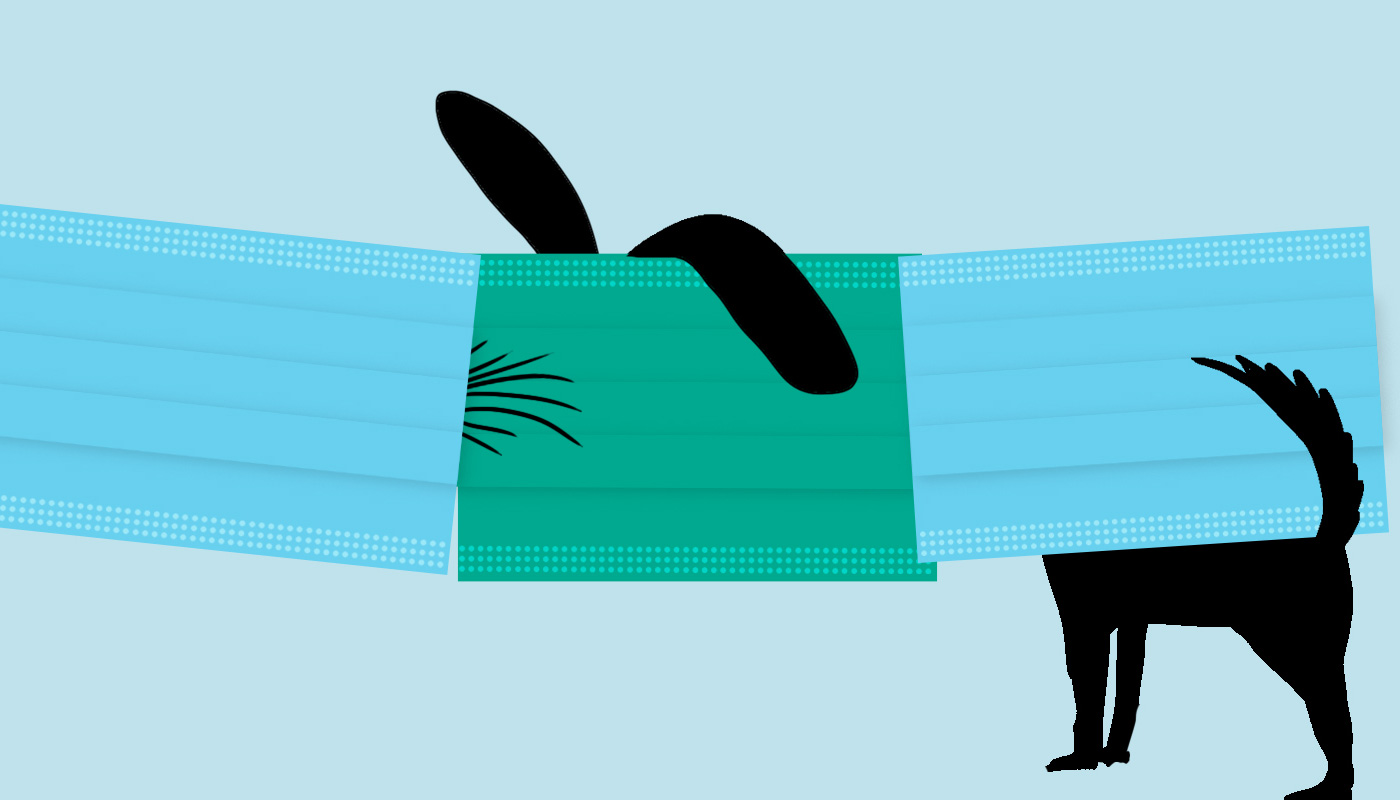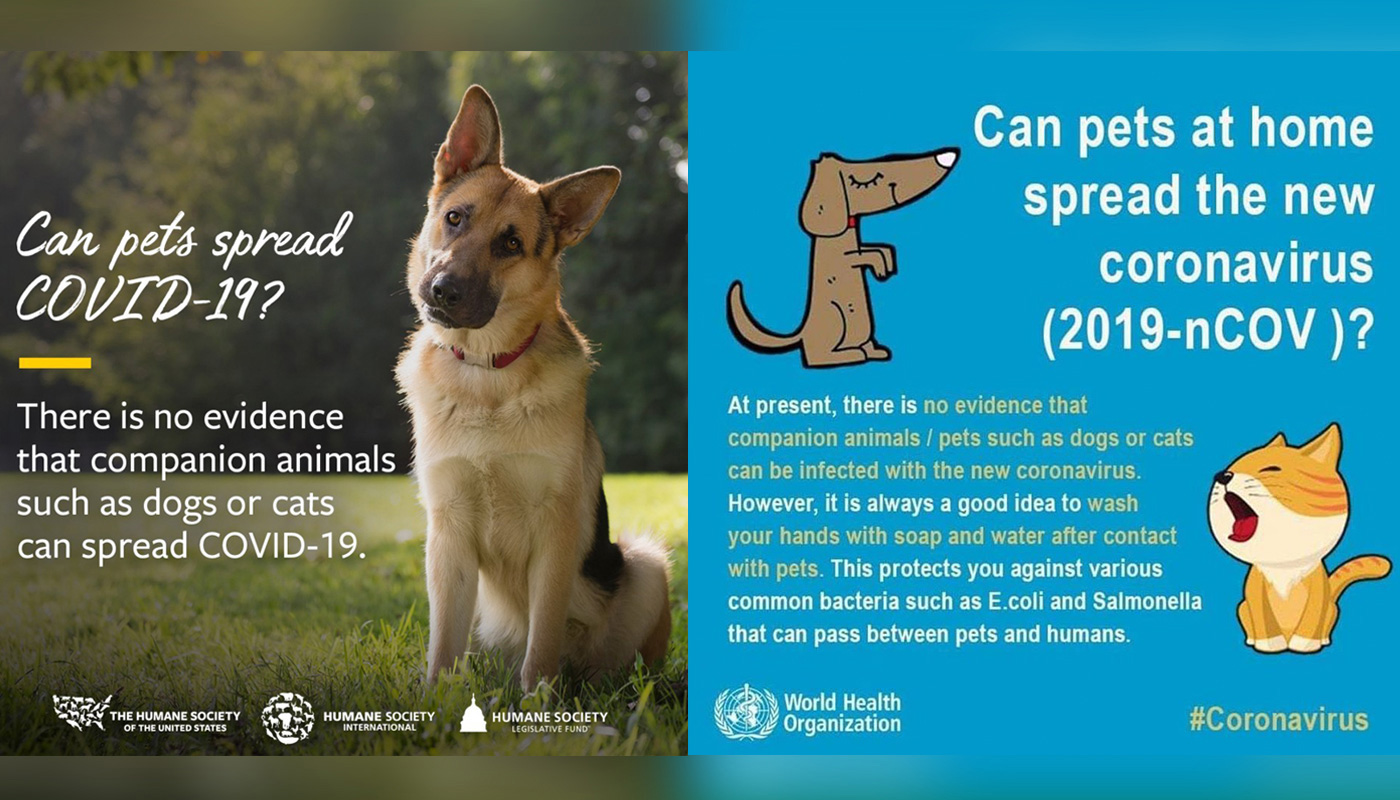Accidental Victims in the Pandemic
May 2020

The battle against the coronavirus pandemic continues. At the time of writing this article, the number of confirmed cases and deaths worldwide exceeded three million and 210,000, respectively. This is truly heart-wringing. What makes this even worse is the spread of the virus to animals around—by the end of February, the first case of animal contagion was reported in Hong Kong, where a pup had tested ‘weakly positive’ for SARS-Cov-2. Shortly after, dogs and cats in Hong Kong and Belgium were reported to have been infected. On 5 April, a four-year-old female Malayan tiger from the Bronx Zoo in New York City fell victim to the malady, and by the end of April, two domestic cats from the US were also tested positive. For pet lovers like myself, these are undoubtedly worrying news.
Human vaccines or medicines are still lacking at this very moment, so what will happen to our pets if they get sick? Rumours about animals being potential virus carriers spread like wildfire, so does that mean there will be a surge in abandoned pets? Cats and dogs in animal shelters already have a hard time surviving, let alone those that are abandoned on the streets.
It seems, unfortunately, these nightmares did become reality! On 29 February, a Lebanese television station wrongfully broadcast that cats and dogs can infect humans with the coronavirus. Although clarified as a bogus report afterwards, the seeds of panic were sowed in people’s hearts. The number of abandoned cats and dogs skyrocketed in Lebanon. Some locals even left poisonous food on the streets, hoping that the strays would die out and thereby reduce the risk of infection. Footages on social media also show dozens of dogs convulsing and foaming at the mouth upon consuming the lethal foodstuff.
Let us shift the focus back to Hong Kong. According to the Thematic Household Survey Report No. 66 published by the Census and Statistics Department last June, the numbers of dogs and cats kept by Hong Kong households were some 221,000 and 184,100, respectively; excluding pets like rabbits, parrots and birds, the strays and those waiting for adoption in rescue organizations, the total sum was a dizzying 405,100.
The strays are a pretty common sight at CUHK: I often see a black cat hanging around the University Administration Building. There is a wooden sign warning drivers to look out for cats and watch their speed at the New Asia Circuit outside Staff Student Centre—Leung Hung Kee Building. Indeed, lives of the strays received much attention on campus during these pandemic-stricken days.

To provide more information on tackling the coronavirus, the Faculty of Medicine added a brand-new section, ‘Things you need to know about COVID-19’, on their Facebook page in January this year. Prof. David Hui, Stanley Ho Professor of Respiratory Medicine, is an expert sitting on the government's advisory panel on Covid-19 control measures. He articulated clearly in his ‘Things you need to know about COVID-19—Pets’ piece on 29 February: ‘There is no evidence that dogs or cats are infectious and become carriers of the virus, be it in the times of SARS, Middle East Respiratory Syndrome (MERS) or the novel coronavirus.

‘A weak positive test result doesn’t mean that the dog has in fact been infected. There is a possibility that the patient's droplets contaminated the environment or spilled onto the dog. Ultimately, the blood of the dog must be tested for antibodies.’
Subsequently, the World Health Organization, the World Organisation for Animal Health and the World Small Animal Veterinary Association also made declarations that there is no evidence whatsoever for dogs and cats to be susceptible or capable of transmitting the novel coronavirus.

Just like what the experts have said, COVID-19 right now is chiefly limited to human-to-human transmission. As they are in close contacts with their infected owners, these domesticated cats and dogs therefore have a higher chance picking up traces of virus on their snouts or muzzles. The cases on pets are ‘suspected’ only, not ‘confirmed’. It is unimaginable to see how people miscomprehend the situation which, in the end, drive them to commit hideous acts of food poisoning. Because of such a mix up in concepts and words, some of these animals lost their lives.
With the impacts of novel coronavirus on animals pending further investigations, pet owners have tried hard to protect both themselves and their furry fellows from contagion. My kitties spend most of their time indoors so, lucky for me, I have one less thing to worry about. On the other hand, canines love to spend time outdoors and sniff around during their walks. Some dog owners therefore don their babies with masks and protective clothing when they walk their pets. Nevertheless, various veterinarians questioned the effectiveness of these attires.

In ‘Things you need to know about COVID-19—Pets’, Professor Hui also pointed out that pet owners should take the following protective measures:
- Wear face masks when you take your animals out
- Wash your hands after going out or touching your pets
- Pay attention to household hygiene
- If you are unwell, you should avoid direct contact with your pets, such as kissing, hugging and sharing your food. Try not to spill any of your droplets onto your pets
- If your cats or dogs are unwell, seek veterinary advice immediately
Several animal health nets and organizations also provide some comprehensive tips in combating COVID-19. For example, dog owners should minimize the frequencies of the walks and maintain a two-metre distance from people and animals around. Wipe or rinse the fur and paws of your dog with cleaning supplies after the walk. Unless absolutely necessary, cancel all veterinary appointments.
It is common practice for city dwellers to clean their homes with diluted bleach, but there lurks a peril: bleach contains chlorine and phenols, and long-term inhalation of these chemicals can cause liver and kidney problems, anemia and even cancer. As dogs and cats tend to lie and sleep on the ground (some even lick the floor during their dreams!), the use of bleach thus endangers the lives of our beloved furry friends.
Tightening household cleaning is not much of an ordeal, but cutting down the interaction time with our pets is definitely no easy feat. Let me tell you a story of mine: one of my cats has been a notorious ‘otaku’ since birth, always hides at corners and plays hard to get (she denies all my attempts of ‘cat-sniffing’—burying your nose on a cat’s fur and snuff, that is. Talk about that!). She fell terribly ill last year and had to go through a two-day operation. When I went to the veterinary hospital the day after the surgery, the veterinary assistant told me she did not eat anything at all. Somehow she ate like a horse—no pun intended—when I handed her the food. She immediately went on her fasting streak after I left, leaving the vet no choice but to discharge her early.
Even in this short period of time, you can see how my cat, the reticent little recluse, expressed fidelity to me (much in her own subtle way). Now imagine how dogs—the avatars of loyalty and affection—feel when owners give them the cold shoulders?
From the perspective of epidemic prevention, it is understandable for experts to advise owners to keep their distance from the pets at all times during these homebound days. However, as animals do not know what ‘social distancing’ is all about, shutting our pets out from our lives entirely will only make them anxious and feel rejected.
There was a Japanese movie called Ten Promises to My Dog that premiered some years ago. One of the promises was like this: ‘Remember, you have your work, your entertainment and your friends, but all I have is you.’
On 8 April, the Netherlands arranged a charter flight to pick up European tourists that were stranded in Peru. Hundreds of European tourists travelled to Lima, the capital of Peru, to board the flight. Instead of taking the direct flight back to Germany, some German tourists opted for the charter flight to the Netherlands, simply because the latter allowed them to bring their dogs on board.
With the ‘stay-at-home order’, ‘state border closures’ and ‘group gathering prohibitions’ still going around, in these arduous times, we are fortunate to have our pets standing by our sides. In New South Wales, Australia, demand for rescue animals has soared as people are stuck at home. Adoptions and foster enquiries have risen 300% recently. To reciprocate their unconditional love, the least we can do is to keep our animal companions safe and sound.

C.F.

